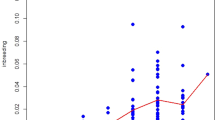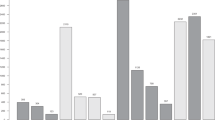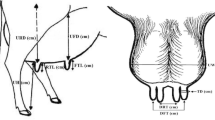Abstract
A STUDY of the milk yields of the progeny of 728 bulls of the Red Danish breed has been made with a view to determine—first, the ability of each bull to transmit the different degrees of milking capacity; and secondly, having thus obtained an index of this ability, to determine the extent to which it was influenced by the various animals in his pedigree. The average number of daughters to each bull was 18. The figures were taken from the annual reports of the Milk Recording Societies throughout Denmark for 1918–1931. The daughters' yields were mainly calculated on the average of the first two lactations and corrected to the third lactation. The records of the dams and grandams were based on as many lactations as possible, from three to ten, and averaging 5.5. The average of these uncorrected lactations was taken as an indication of the milking capacity of the dam or grandams.
This is a preview of subscription content, access via your institution
Access options
Subscribe to this journal
Receive 51 print issues and online access
$199.00 per year
only $3.90 per issue
Buy this article
- Purchase on Springer Link
- Instant access to full article PDF
Prices may be subject to local taxes which are calculated during checkout
Similar content being viewed by others
References
Smith, A. D. Buchanan, Scott, F. J., and Fowler, A. B., "Inheritance of Milk Yield in Ayrshire Cows", J. Dairy Research, 1, 174–179; 1930.
Author information
Authors and Affiliations
Rights and permissions
About this article
Cite this article
MADSEN, K. Inheritance of Milking Capacity. Nature 129, 165–166 (1932). https://doi.org/10.1038/129165b0
Issue Date:
DOI: https://doi.org/10.1038/129165b0
Comments
By submitting a comment you agree to abide by our Terms and Community Guidelines. If you find something abusive or that does not comply with our terms or guidelines please flag it as inappropriate.



